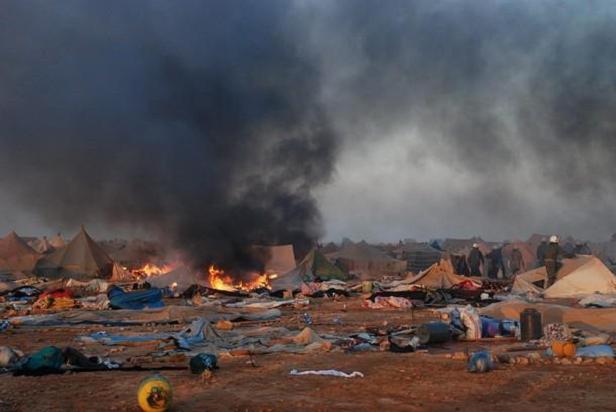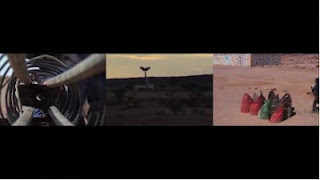In a flaky pink apartment block in the Nahader district, a girl with henna on her hands pulled back the metal door and ushered me up the stairs. In a large room fringed with cushions, I sat on the woollen rug of a guest room while Mohammed Ali, director of the local mine victims’ association, prepared tea on a coal stove. I had come to listen to Ahmed, a student in his early twenties who was involved in a landmine accident a couple of years ago.
‘I was visiting my friend in an area south-east of Laayoune, about three hundred kilometres south,’ said Ahmed. He was an angular young man in his early twenties, his square-cut face softened by his glasses. ‘I was in the Land Rover with my friend’s father, Mohammed Nadher. He kept camels and around three hundred goats and we were driving between his tent and the field where he kept his goats when the back wheels went over an anti-charge. I remember running – about fifty metres away – I just ran – it was only when I was away from the explosion that I understood what had happened. My friend’s father was lying on the ground near the car. I pulled him away but the explosion had torn his feet open so he couldn’t walk. His sons heard the explosion and they came to find us, followed by the police who took us to Mohammed’s tent.’
An ambulance came, much later, carrying Ahmed and Mohammed to the military hospital in Laayoune.
‘But,’ he explained, ‘they only looked at our injuries. I was burned all the way up my leg. They refused to do anything for us, so we were taken to another hospital, and by this time it was too late to save Mohammed’s foot so his toe had to be amputated.’
It was only after several months of recovery that Mohammed went back to his flock; but now, unsteady on his feet, he was unable to herd them as well as in the past, so he sold up and moved to Laayoune.
‘What about you?’ I asked. ‘Did you have any after-effects?’
‘I hear a buzzing in my ears sometimes,’ he said, ‘but I am strong, I’m not afraid.’
For Mohammed Ali, it was clear who was to blame.
‘The Moroccan government,’ he said, ‘doesn’t even publicise the mine situation – there are no posters about it, they never mention it on TV or radio, so people aren’t educated about it. Especially people who live in the desert – they need to know about the mines but many of them don’t even know what a mine looks like.’
 |
| Saharawi landmine victim (in the camps). Photo by Bernat Millet |
Mohammed and Ahmed talked angrily of the Moroccan government’s failure to sign the Ottawa accord guaranteeing reparations to victims, or to make substantial efforts to map the mined areas.
‘It’s not only Morocco who planted the mines,’ said Mohammed, ‘Mauretania, Spain and the Polisario have all been responsible, but it is Morocco that has the authority here and they do nothing to help us. We’re Saharawi – we love the desert, it’s part of us. I like to spend my time in the city but also in the desert. But we have to be so careful when we go into the desert because of the mines.’
‘Without the desert,’ said Ahmed, ‘we are like fish out of water. But how can we use the desert when we are afraid we may step on a mine?’










